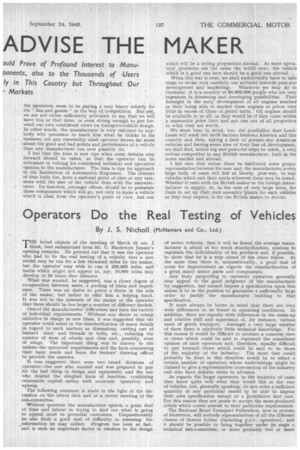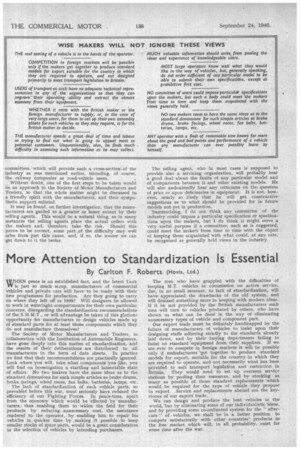Operators Do the Real Testing of Vehicles
Page 31

Page 32

If you've noticed an error in this article please click here to report it so we can fix it.
By J. S. Nichol! (McNamara and Co., Ltd.) THE broad objects of the meeting of March 31 are, I think, best summarized from Mr. G. Mackenzie Junner's opening remarks. He pointed out that it was the operator who had to 'do the real testing of .a vehicle; that a new model may be run for a few thousand miles by the maker, but the operator may wish to run it 200,000 miles, and faults which might not appear at, say, 10,000 miles may develop in 20 times that distance.
• What was wanted, he suggested, was a closer degree of co-operation between users, a pooling of ideas and experience. There was no desire to prove a thorn in the side of the maker, but rather to offer him a helping hand. It was not in the interests of the maker or the operator that there should be too large a number of different models.
One of the manufacturers' difficulties had been the variety of individual requirements_ Without any desire to cramp initiative in design or new ideas, it was suggested that the operator could assist in the standardization of many details in regard to such matters as dimensions, cutting out Of bastard sizes and threads in bolts, etc., reducing the number Of sizes of wheels and rims and, possibly, even of wings. The important thing was to convey to the makers the operators' requirements and the facts concerning their basic needs and leave the makers' drawing offices to' provide the answers.
It was suggested there were two broad divisions of operator—the one who wanted and was prepared to pay for the last thing in design , and equipment, and the one who desired the simplest form of machine, combining reasonable capital outlay with economic operation and upkeep.
The following comment is made in the light of the discussion on the above date and at a recent meeting of the sub-committee.
Without question the manufacturer spends a great deal of time and labour in trying to find out what is .going to appeal most to potential customers. Unquestionably he also finds a good deal of difficulty in assessing • the .information he may collect. Progress has been so fast, and is such an important factor in relation to the design
of motor vehicles, that it will be found the average manufacturer is afraid of too much standardization, anxious to maintain the individuality of his products and, if possible, to show that he is a step ahead of the other fellow. At the same time there is, unquestionably, a good deal of room for improvement as regards the standardization of a great many minor parts and components.
Any body purporting to represent operators generally may appeal to the good judgment of the manufacturer • by suggestion, but cannot impose a specification upon him unless it be in the position to guarantee a sufficiently large order to justify the manufacturer building to that specification.
It must always he borne in mind that there are very wide differences to be found in operating conditions. In addition, there are equally wide differences in the make-up and relative skill and experience of, for instance, various users of goods transport. Amongst a very large number of them there is relatively little technical knowledge. For this reason it would be difficult to produce a concrete view or views which could be said to represent the considered opinion of such operators and, therefore, equally difficult to put forward views which could be said to be those of the majority of the industry. The most that could probably be done in this direction would be to select a certain number of operators whose undertakings might be claimed to give a representative cross-section of the industry
and who have definite views to advance. .
As regards the larger operators, in the majority of cases they know quite well what they Would like in the way of vehicles, but, generally speaking; do not order a sufficient quantity of any particular model to be able to impose their oWn specification except at a prohibitive first cost. 'For this reason they are prone to accept the mass-produced article which comes nearest to their particular requirements.
The National Road Transport Federation, now in process of formation, will embody representatives of all the different classes of licence holder (including p.s.v. operators), and it should be possible to bring together under its aegis a technical. sub-committee, or more probably two or more
committees, -which will provide such a cross-section; of the industry as was mentioned earlier, including, of course, the railway companies as road-vehicle Users.
Without doubt, one of the first 'steps to he taken would be an approach to the Society of Motor Manufacturers and Traders, so that the whole matter might be discussed in, a friendly spirit with the manufacturers, and their sympathetic support enlisted.
It may be found, on further investigation, that the manufacturers are guided to a greater or lesser extent by their selling agents. This would be a natural thing, as in many instances the selling agents place the actual orders with the makers and, therefore, take the risk. Should this prove to be correct, some part ,of the difficulty may well arise from just this cause, and, if so, the sooner we can get down to it the better. The selling agent, who in most cases is supposed to provide also a servicing organization, will probably hear a good deal about the faults of any particular model and of comparisons between it and other existing models. He will also undoubtedly hear any criticisms on the question of price or upon deficiencies in equipment. It is not, however, nearly so likely that he will get constructive suggestions as to what should be provided for in future models not yet in production.
• 'Summarizing, I do not think any committee of the industry could impose a particular specification or specifications upon the makers, but I do think it might serve a very useful purpose if a committee, such is is suggested, could meet the makers from time to time with the object of keeping them acquainted with what could, at any rate, be recognized as generally held views in the industry.




























































